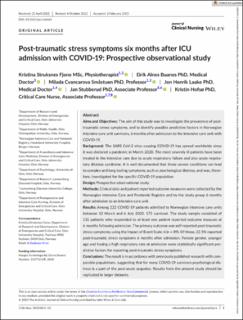| dc.contributor.author | Fjone, Kristina Struksnes | |
| dc.contributor.author | Buanes, Eirik Alnes | |
| dc.contributor.author | Småstuen, Milada Cvancarova | |
| dc.contributor.author | Laake, Jon Henrik | |
| dc.contributor.author | Stubberud, Jan Egil | |
| dc.contributor.author | Hofsø, Kristin | |
| dc.date.accessioned | 2024-02-08T11:07:16Z | |
| dc.date.available | 2024-02-08T11:07:16Z | |
| dc.date.created | 2023-03-17T14:48:48Z | |
| dc.date.issued | 2023 | |
| dc.identifier.citation | Journal of Clinical Nursing (JCN). 2023, 33 (1), 103-114. | en_US |
| dc.identifier.issn | 0962-1067 | |
| dc.identifier.uri | https://hdl.handle.net/11250/3116358 | |
| dc.description.abstract | Aims and Objectives: The aim of this study was to investigate the prevalence of post-
traumatic stress symptoms, and to identify possible predictive factors in Norwegian
intensive care unit survivors, 6 months after admission to the intensive care unit with
COVID- 19.
Background: The SARS CoV-2 virus causing COVID-19 has spread worldwide since
it was declared a pandemic in March 2020. The most severely ill patients have been
treated in the intensive care due to acute respiratory failure and also acute respira-
tory distress syndrome. It is well documented that these severe conditions can lead
to complex and long-lasting symptoms, such as psychological distress, and was, there-
fore, investigated for the specific COVID-19 population.
Design: Prospective observational study.
Methods: Clinical data and patient reported outcome measures were collected by the
Norwegian Intensive Care and Pandemic Registry and by the study group 6 months
after admission to an intensive care unit.
Results: Among 222 COVID-19 patients admitted to Norwegian intensive care units
between 10 March and 6 July 2020, 175 survived. The study sample consisted of
131 patients who responded to at least one patient reported outcome measure at
6 months following admission. The primary outcome was self-reported post-traumatic
stress symptoms, using the Impact of Event Scale-6 (n = 89). Of those, 22.5% reported
post-traumatic stress symptoms 6 months after admission. Female gender, younger
age and having a high respiratory rate at admission were statistically significant pre-
dictive factors for reporting post-traumatic stress symptoms.
Conclusions: The result is in accordance with previously published research with com-
parable populations, suggesting that for many COVID-19 survivors psychological dis-
tress is a part of the post-acute sequelae. Results from the present study should be
replicated in larger datasets.
Relevance to Clinical Practice: This project provides important insight to post-acute
sequelae after COVID-19 that patients may experience after critical illness. | en_US |
| dc.language.iso | eng | en_US |
| dc.rights | Navngivelse-Ikkekommersiell 4.0 Internasjonal | * |
| dc.rights.uri | http://creativecommons.org/licenses/by-nc/4.0/deed.no | * |
| dc.title | Post-traumatic stress symptoms six months after ICU admission with COVID-19: Prospective observational study | en_US |
| dc.type | Peer reviewed | en_US |
| dc.type | Journal article | en_US |
| dc.description.version | publishedVersion | en_US |
| cristin.ispublished | true | |
| cristin.fulltext | original | |
| cristin.qualitycode | 2 | |
| dc.identifier.doi | 10.1111/jocn.16665 | |
| dc.identifier.cristin | 2134872 | |
| dc.source.journal | Journal of Clinical Nursing (JCN) | en_US |
| dc.source.volume | 33 | en_US |
| dc.source.issue | 1 | en_US |
| dc.source.pagenumber | 103-114 | en_US |
| dc.relation.project | Norges forskningsråd: 312712 | en_US |

